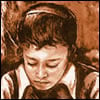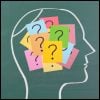The Torah reading of Emor (Leviticus 21:1-24:23) begins with an instruction from G‑d to Moses: "Speak to the priests, the sons of Aaron, and say to them." The Talmud explains that the double terminology ("speak... and say") means "enjoin the elders regarding the youngsters." Here we have the biblical source of the concept of education: our empowerment — and duty — to confer the wisdom and instruction we received from our fathers, mothers and teachers to the next generation.
In the 6th chapter of Deuteronomy there are five verses — known as the Shema — which are recited by the Jew every morning and evening, expressing five fundamental precepts of Judaism: the mitzvah to avow the unity of G‑d, to love G‑d, to study the Torah, to bind the tefillin on our arms and heads, and affix mezuzot on the doorposts of our homes. And how does the Shema convey the precept of Torah study? In the context of the duty to teach it to our children:
And these words, which I command you this day, shall be upon your heart; you shall teach them thoroughly to your children, and you shall speak of them when sitting in your home and walking on the road, when you lie down and when you rise. (Deuteronomy 6:6)
Our Sages tell us that when G‑d came to give the Torah to the children of Israel at Mount Sinai, He demanded a guarantee that that they will not forsake it.
Said the people of Israel: "The heaven and the earth shall be our guarantors."
Said G‑d: "They won't last forever."
Said they: "Our fathers will guarantee it."
Said He: "They are busy."
Said they: "Our children will guarantee it."
Said He: "These are excellent guarantors."
This is the key to the eternity of a people, the guarantee that man's work as "a partner with G‑d in creation" continues: that each generation transmit to the next all that they have learned and achieved towards the realization of our covenant with G‑d — the commitment we made to actualize the divine potential for goodness and perfection imbued by the Creator in creation.
On the face of it, education is the training of children and youngsters. It is the child who obviously needs to be taught — to be imparted knowledge, to be aided in the honing of faculties and skills, to be guided in the development of a moral self that distinguishes between right and wrong and never loses sight of its responsibilities towards G‑d and man.
But as the articles assembled in this anthology demonstrate, education is a life-long endeavor. Within our own selves, too, there is the "elder" and the "youngster," our yesterday and our tomorrow, and the former must never cease to guide and instruct the latter. Within our own selves, too, is a perpetual need to learn, develop and grow, to cultivate the seeds and saplings of our present potential into the trees and fruits of future achievement. We talk about the child because in the child the need is evident, the transition visible, and the results tangible. So only by examining how we educate our children can we know how to educate ourselves.
Insights:
Three Lies Every Educator Should Know
Essays:
Do We Lie to Our Children?
by Yanki Tauber
The View From My Child's Window
by Jay Litvin
In Pursuit of Ignorance
by Yaakov Brawer
Fortysomething
by Susan Handelman
Judges and Kindergartens: Government and the idea of education in the teachings of the Lubavitcher Rebbe
by Tzvi Freeman
The Third Millennium
based on the teachings of the Lubavitcher Rebbe
Stories:
A Rebbe's Education
from the writings of the sixth Lubavitcher Rebbe, Rabbi Yosef Yitzchak Schneersohn
The Benefits of Being Stupid When You're Old
by Jay Litvin
Kosher Marks
by Michael Medved
The 3:00am Audience
told by Tzvi Yair
Getting Your Way
by Yaakov Lieder
Upsherin
by Deena Yellin
I Can Show You the Pictures
by Jay Litvin
See also:
Rabbi Yaakov Leider's Parenting Articles







Join the Discussion